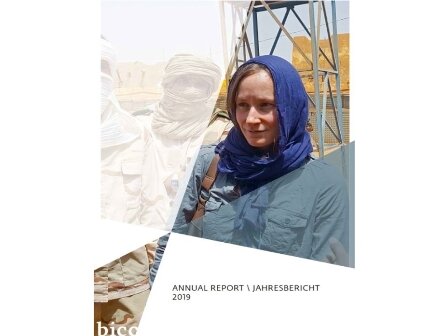Press releases
BICC Annual Report 2019 \ Research in the field and advisory activities in regions with ever-changing violent conflict settings
BICC’s Annual Report illustrates: The unique scientific expertise of the institute derives from the empirical insights that its researchers in particular gain by conducting fieldwork on the ground or providing advisory services in regions with ever changing violent conflicts.

In his foreword to BICC Annual Report 2019, Professor Herbert Wulf, founding director of BICC from 1994 to 2001, praises the development of the peace and conflict research institute that celebrates its 25th anniversary this year: “BICC has risen to the new challenges and developed diverse, practice-oriented research and advisory projects”.
With its focus on organised violence, BICC also investigates the interplay of violence, societal order and change. “The starting point for our research in the field in many regions of the world, for instance on forced mobility and displacement, is always the perspective of those affected by it”, stresses Conrad Schetter, Director for Research at BICC. This thought is also reflected in the Essay in the Annual Report that ask about the human rights situation in stabilisation measures.
This perspective is also evident in the research and advisory activities in other BICC research clusters.
In its research cluster “Dynamics of violent conflict”, BICC focussed on non-state violent actors in 2019. Its field research in this cluster was about reintegration measures in UN programmes or in Afghanistan, conflict dynamics in Ukraine and preventing radicalisation in North Rhine-Westphalia. “The prevention of radicalisation in North Rhine-Westphalia, which is directed against extremist and terrorist provocation strategies from Islamists or right-wing extremists, is also a highly topical research fields for us”, Conrad Schetter explains.
The cluster “Armament and arms control”, in turn, focusses on advising and cooperating with international and regional organisations in the context of small arms control in Africa. Another focus lies on the effects of German and European arms transfers to regions caught up in conflicts.
Press release “BICC-Jahresbericht 2019 \ Feldforschung und Beratungsaufenthalte in Regionen mit volatilen Gewaltkonflikten“ (pdf, in German)
With its focus on organised violence, BICC also investigates the interplay of violence, societal order and change. “The starting point for our research in the field in many regions of the world, for instance on forced mobility and displacement, is always the perspective of those affected by it”, stresses Conrad Schetter, Director for Research at BICC. This thought is also reflected in the Essay in the Annual Report that ask about the human rights situation in stabilisation measures.
This perspective is also evident in the research and advisory activities in other BICC research clusters.
In its research cluster “Dynamics of violent conflict”, BICC focussed on non-state violent actors in 2019. Its field research in this cluster was about reintegration measures in UN programmes or in Afghanistan, conflict dynamics in Ukraine and preventing radicalisation in North Rhine-Westphalia. “The prevention of radicalisation in North Rhine-Westphalia, which is directed against extremist and terrorist provocation strategies from Islamists or right-wing extremists, is also a highly topical research fields for us”, Conrad Schetter explains.
The cluster “Armament and arms control”, in turn, focusses on advising and cooperating with international and regional organisations in the context of small arms control in Africa. Another focus lies on the effects of German and European arms transfers to regions caught up in conflicts.
Press release “BICC-Jahresbericht 2019 \ Feldforschung und Beratungsaufenthalte in Regionen mit volatilen Gewaltkonflikten“ (pdf, in German)


